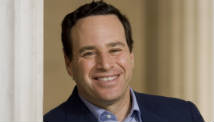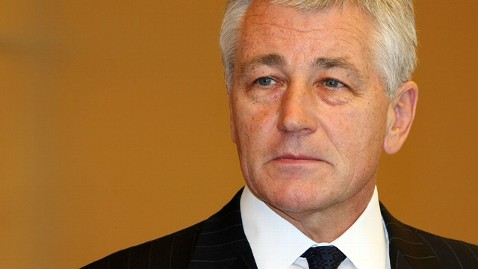STORY HIGHLIGHTS
- Al Gore sold Current to al Jazeera and could net an estimated $70 million
- Howard Kurtz: Gore's Current network failed to gain an identity or viewers
- He says it's odd that the former vice president is selling to an oil-rich potentate
- Kurtz: Al Jazeera may have a tough time getting traction with U.S. viewers
Editor's note: Howard Kurtz is the host of CNN's "Reliable Sources" and is Newsweek's Washington bureau chief. He is also a contributor to the website Daily Download.
(CNN) -- So Al Gore starts a liberal cable network, which turns into a complete and utter flop, then sells it to a Middle East potentate in a deal that will bring him an estimated $70 million.
Is America a great country or what?
There is something highly unusual -- OK, just plain weird -- about a former vice president of the United States doing this deal with the emir of Qatar, Sheikh Hamad bin Khalifa al-Thani.

Howard Kurtz
Al Jazeera, owned by said emir's government, is trying to buy its way into the American television market by purchasing Current TV for a half billion dollars. The only thing stranger would be if Gore had sold Current to Glenn Beck -- oh wait, Beck did try to buy it and was told no way within 15 minutes.
So the sale was in part about ideology, which opens the door to examining why Gore believes Al Jazeera gives "voice to those who are not typically heard" and speaks "truth to power."
Bill O'Reilly, on Fox News, calls the network "anti-American." Fox pundit Dick Morris says Gore has sold to a fount of "anti-Israel propaganda." Such labels are rooted in the network's role during the height of the war on terror, when it aired smuggled videos of Osama bin Laden and was denounced by Bush administration officials.
Watch: How Lance Armstrong lied to me about doping
But Al Jazeera English, the spinoff channel launched in 2006, doesn't have the same reputation. In fact, no less a figure than Secretary of State Hillary Clinton has praised it as "real news," and the channel has won journalism awards for its reporting on the Arab Spring and other global events.
To be sure, the main Al Jazeera network gives a platform to such figures as Yusuf al-Qaradawi. He's the Muslim cleric in Egypt who, The Washington Post gas reported, frequently appears on air to castigate Jews and America and has praised suicide bombings. But when I went to the home page of Al Jazeera English the other day, there was video of David Frost, the acclaimed British journalist who now works for the main network, interviewing Israeli President Shimon Peres.
That's not to say Al Jazeera America, the working name for the new channel, won't have its own biases. Al Jazeera English is sometimes determined to paint the U.S. in a negative light.
During a report on President Barack Obama signing a renewal of the Foreign Intelligence Surveillance Act, which entails a legitimate controversy over civil liberties, the reporter said flatly that the law "violate(s) U.S. constitutional rights in the name of national security."
Watch: Can Al Jazeera make it in the American market?
Dave Marash, the ABC News veteran who once worked for Al Jazeera English, told me the network has a "post-colonial" view of America and its stories can be infused with that attitude.
And there are real questions about how independent these channels are from the Qatar government that helps bankroll them. The director-general of Al Jazeera, Sheikh Ahmed bin Jassim al-Thani, is a member of the country's royal family and has no background in journalism.
Such details add to the odd spectacle of the ex-veep, who would have been running Mideast policy had he won a few more votes in Florida, selling -- and some say selling out -- to the emir. Not to mention that the crusader against climate change is taking petrodollars from an empire built on oil, the bete noire of environmentalists.
Watch: Hey Fox, Hillary Clinton was sick after all
But what is Al Jazeera buying? The network is going to have a tough time cracking the American market.
Its earlier reputation makes the company highly controversial, and other cable carriers might follow the lead of Time Warner Cable (which is no longer owned by CNN's parent company, Time Warner) in refusing to carry it. These carriers agreed to air Current TV, after all, and contracts generally require them to approve a major change in programming.
Global politics aside, it may just be bad business. There's a reason Al Jazeera English, which will supply 40% of the content to the new channel, has barely gotten a foothold in the United States. Most Americans aren't lusting for a steady diet of international news.
Watch: Did Nancy Pelosi go too far in photoshopping picture of congresswomen?
There's no denying that Gore, a onetime newspaper reporter who had testy relations with the press during his 2000 campaign, presided over a lousy cable channel. No one quite knew what Current was during the years when it aired mostly low-rent entertainment fare and was famous mainly for North Korea taking two of its correspondents, including Lisa Ling's sister Laura, into custody.
Then Gore tried to relaunch it as a talking head channel to the left of MSNBC, hiring Keith Olbermann -- a relationship that ended with his firing and mutual lawsuits -- along with the likes of Eliot Spitzer and Jennifer Granholm, former Michigan governor. Gore himself offered commentary during major political events.
It was the utter failure of that incarnation of Current that prompted Gore and co-founder Joel Hyatt to put the thing up for sale.
Some detractors have slammed Gore for hypocrisy because, while he has advocated higher taxes on the rich, he tried to get the Al Jazeera deal done by December 31 to avoid the Obama tax hike. (The sale didn't close until January 2.) I don't see a problem trying to legally take advantage of changes in the tax code, no matter what your political stance.
Nor do I want to prejudge Al Jazeera America. The marketplace will decide its fate.
But there is something unsettling about Gore making off with such a big payday from a government-subsidized channel after making such bad television. Nice work if you can get it.
Follow @CNNOpinion on Twitter
Join us at Facebook/CNNOpinion
The opinions expressed in this commentary are solely those of Howard Kurtz.














